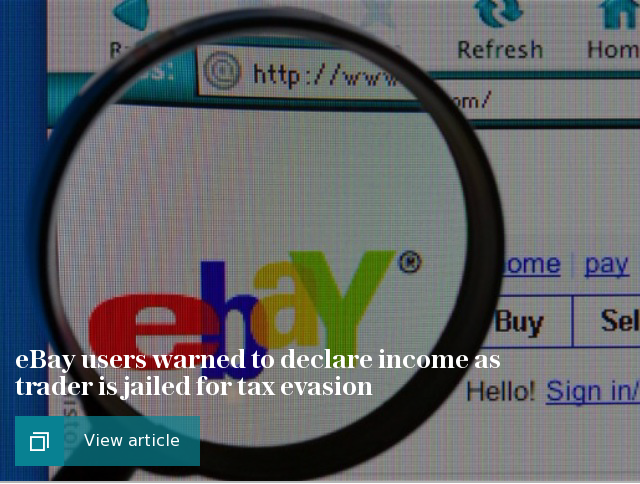HMRC takes aim at eBay and Airbnb – but how much tax do you have to pay on sales?

Online platforms – including eBay and AirBnb – must do more to ensure their customers pay tax, the Government has said, amid fears a high a proportion do not understand how the system works.
Chancellor Philip Hammond used yesterday's Spring Statement to launch a call for evidence on how web companies offering services in the "gig economy" should help users pay the correct amount of tax.
The Government has not named the platforms, but it is understood to be referring to firms including short-term lettings site Airbnb, online marketplaces eBay and Etsy, and car sharing website Uber.
Millions of people use these sites to supplement their income but only one in four users are confident in their knowledge of their tax status, according to HM Revenue & Customs research.
Today's call for evidence said: "Many of those earning money through a platform may never have previously made money without an employer to act as an intermediary between them and HMRC."
The taxman also warned of a "minority" who are using platforms to avoiding paying their fair share of tax. It noted other countries including France, Estonia and Belgium have already taken steps to tax income from these emerging companies in a different manner to conventional income.
Last year two new allowances relating to online income were launched, retrospectively applying to the 2017-18 tax year, yet they are little known. Tax experts have warned users could pay thousands too much in tax unless the allowances are applied correctly.
Earn £2,000 tax free using two new allowances
The trading allowance became law in late 2017 but applies to the 2017-18 tax year.
It gives a £1,000 tax free allowance for income from "trading" activities, such as selling your own products online or doing freelance writing work, and a £1,000 allowance relating to property, such as renting out a room on Airbnb.
Income below £1,000 is tax free and does not need to be declared – in the past, HMRC should have been notified of every £1 of income.
But unsuspecting people unused to filling out a tax return could inadvertently end up paying enormous "marginal" tax rates simply by earning £1 more than the allowance, the Institute of Chartered Accountants has warned.

The issue arises because individuals need to tell HMRC, in a process known as "making an election", that they want to use the £1,000 allowance. This matters where incomes from these sources are above £1,000. Where they are below £1,000, it does not matter – because HMRC is not going to be informed anyway.
Say you had £1,000 turnover from selling books via eBay and costs of £100. That would generate profits of £900 and there would be no tax to pay under the new rules, and no need to make a declaration.
However, if the turnover was £1,001 you would have to tell HMRC via a tax return. The tax office's default position is to deduct expenses (£100) and charge tax on the profit. If you do not elect to deduct the trading allowance, said the Institute's Sarah Ghaffari, you would pay tax on £901 instead of £1.
Assuming the individual was a basic-rate, 20pc, taxpayer that extra £1 of income would create a tax liability of £180.20, compared to no tax (or, technically, tax on £1) if the person had elected to use the allowance.
You cannot deduct both the allowance and expenses, it is one or the other.
She added: "These allowances are available to all individuals and can be enjoyed by casual sellers and those looking to make extra cash before the holiday season.
"The question is whether these individuals will be aware that they need to make an election to deduct the £1,000 allowance instead of actual expenses incurred. Failing to make the election on time could result in tax being paid on a much higher figure."
It is possible to use both the trading allowance and the property allowance, which also takes effect for the 2017-18 tax year, for a combined total of £2,000 tax free income. However, the property allowance cannot be used where "rent a room" relief applies.
This allows the first £7,500 earned from letting out rooms through sites such as Airbnb, or more traditional lodgers and bed and breakfasts to be free of tax.
Examples of where the property allowance would apply is for car parking spaces, rent out a dining room as an ad hoc office, our letting out a front garden for catering for sporting events.
When is a hobby actually a business?
You might think that selling second-hand items and crafts online is a hobby, but the taxman will class you as a business if it can prove you are doing “anything in the nature of trade”.
If you collect items and resell them in a short period of time, or sell home-made crafts online, you could be classed as a business.
HMRC's guidance says: "Evidence that the sole object of acquiring an asset was to re-sell it at a profit, without any intention of holding it as an investment, is a pointer to the conclusion that a trade is being carried on."
However, it adds that profit-seeking is only one factor to be weighed among other "badges of trade" it assesses.
sam.brodbeck@telegraph.co.uk

 Yahoo Finance
Yahoo Finance 